maven高级笔记
Maven高级
1.maven基础知识回顾
1.1 maven介绍
maven 是一个项目管理工具,主要作用是在项目开发阶段对Java项目进行依赖管理和项目构建。
依赖管理:就是对jar包的管理。通过导入maven坐标,就相当于将仓库中的jar包导入了当前项目中。
项目构建:通过maven的一个命令就可以完成项目从清理、编译、测试、报告、打包,部署整个过程。

1.2 maven的仓库类型
1.本地仓库
2.远程仓库
①maven中央仓库(地址:http://repo2.maven.org/maven2/)
②maven私服(公司局域网内的仓库,需要自己搭建)
③其他公共远程仓库(例如apache提供的远程仓库,地址:http://repo.maven.apache.org/maven2/)
1.3 maven常用命令
clean: 清理
compile:编译
test: 测试
package:打包
install: 安装
1.4 maven坐标书写规范

1.5 maven的依赖范围
| 依赖范围 | 对于编译classpath有效 | 对于测试classpath有效 | 对于运行时classpath有效 | 例子 |
|---|---|---|---|---|
| compile | Y | Y | Y | spring-core |
| test | - | Y | - | Junit |
| provided | Y | Y | - | servlet-api |
| runtime | - | Y | Y | JDBC驱动 |
| system | Y | Y | - | 本地的,maven仓库之外的类库 |
2. maven的依赖传递
2.1 什么是依赖传递
在maven中,依赖是可以传递的,假设存在三个项目,分别是项目A,项目B以及项目C。假设C依赖B,B依赖A,那么我们可以根据maven项目依赖的特征不难推出项目C也依赖A。

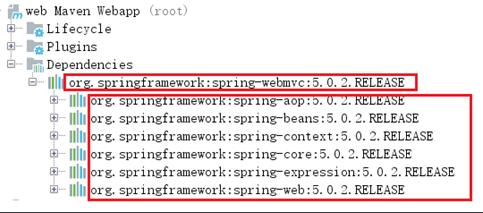
通过上面的图可以看到,我们的web项目直接依赖了spring-webmvc,而spring-webmvc依赖了sping-aop、spring-beans等。最终的结果就是在我们的web项目中间接依赖了spring-aop、spring-beans等。
2.2 什么是依赖冲突
由于依赖传递现象的存在, spring-webmvc 依赖 spirng-beans-4.2.4,spring-aop 依赖 spring-beans-5.0.2,但是发现 spirng-beans-4.2.4 加入到了工程中,而我们希望 spring-beans-5.0.2 加入工程。这就造成了依赖冲突。

2.3 如何解决依赖冲突
1.使用maven提供的依赖调解原则
第一声明者优先原则
路径近者优先原则
2.排除依赖
3.锁定版本
2.4 依赖调节原则——第一声明者优先原则
在 pom 文件中定义依赖,以先声明的依赖为准。其实就是根据坐标导入的顺序来确定最终使用哪个传递过来的依赖。

结论:通过上图可以看到,spring-aop和spring-webmvc都传递过来了spring-beans,但是因为spring-aop在前面,所以最终使用的spring-beans是由spring-aop传递过来的,而spring-webmvc传递过来的spring-beans则被忽略了。
2.5 排除依赖
可以使用exclusions标签将传递过来的依赖排除出去。
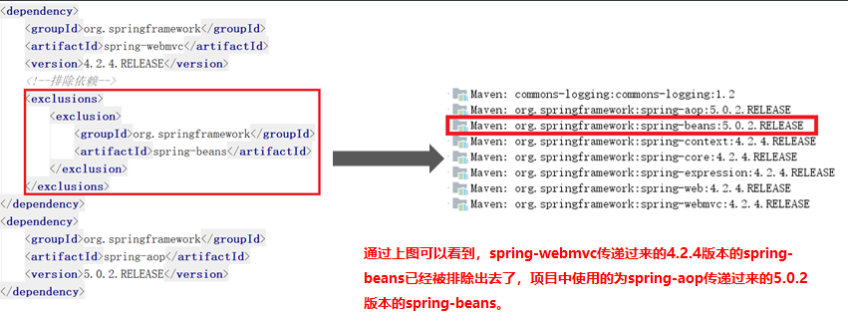
2.6 版本锁定
采用直接锁定版本的方法确定依赖jar包的版本,版本锁定后则不考虑依赖的声明顺序或依赖的路径,以锁定的版本为准添加到工程中,此方法在企业开发中经常使用。
版本锁定的使用方式:
第一步:在dependencyManagement标签中锁定依赖的版本
第二步:在dependencies标签中声明需要导入的maven坐标
①在dependencyManagement标签中锁定依赖的版本
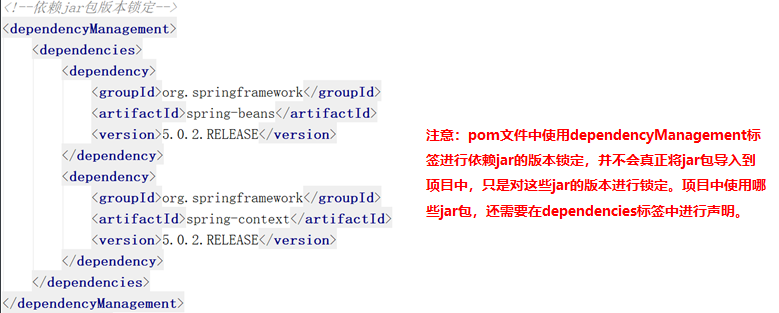
②在dependencies标签中声明需要导入的maven坐标

3.基于maven构建SSM工程案例
3.1 需求描述
本案例基于maven构建 SSM(Spring+SpringMVC+Mybatis)工程,通过maven坐标进行依赖管理。最终实现根据 id 查询商品信息的功能。
3.2 构建maven工程
1.数据库环境搭建
①创建数据库ssmtest
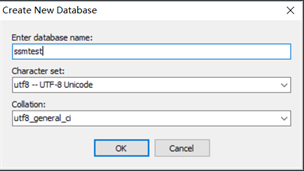
②创建商品表item
CREATE TABLE `item` (
`id` int(11) NOT NULL auto_increment,
`name` varchar(255) default NULL,
`price` float default NULL,
`createtime` datetime default NULL,
`detail` varchar(255) default NULL,
PRIMARY KEY (`id`)
) ENGINE=InnoDB DEFAULT CHARSET=utf8
2.maven项目构建
①创建maven web项目
②配置pom.xml文件
③实现spring+mybatis整合
创建POJO类
public class Item {
private Integer id;
private String name;
private Float price;
private Date createtime;
private String detail;
//省略setter、getter
}
持久层DAO接口编写
public interface ItemMapper {
public Item findById(int id);
}
Mapper映射文件编写
<?xml version="1.0" encoding="UTF-8" ?>
<!DOCTYPE mapper PUBLIC "-//mybatis.org//DTD Mapper 3.0//EN"
"http://mybatis.org/dtd/mybatis-3-mapper.dtd">
<mapper namespace="com.itheima.ssm.dao.ItemMapper">
<select id="findById" parameterType="int" resultType="item">
select * from item where id=#{id}</select>
</mapper>
业务层Service编写
package com.itheima.ssm.service;
import com.itheima.ssm.pojo.Item;
public interface ItemService {
public Items findById(int id);
}
@Service
@Transactional
public class ItemServiceImpl implements ItemService {
@Autowired
private ItemMapper itemMapper;
public Item findById(int id) {
return itemMapper.findById(id);
}
}
spring配置文件applicationContext-dao.xml编写
<?xml version="1.0" encoding="UTF-8"?>
<beans xmlns="http://www.springframework.org/schema/beans" xmlns:context="http://www.springframework.org/schema/context" xmlns:p="http://www.springframework.org/schema/p" xmlns:aop="http://www.springframework.org/schema/aop" xmlns:tx="http://www.springframework.org/schema/tx" xmlns:xsi="http://www.w3.org/2001/XMLSchema-instance" xsi:schemaLocation="http://www.springframework.org/schema/bean http://www.springframework.org/schema/beans/spring-beans-4.0.xsd http://www.springframework.org/schema/context http://www.springframework.org/schema/context/spring-context-4.0.xsd http://www.springframework.org/schema/aop http://www.springframework.org/schema/aop/spring-aop-4.0.xsd http://www.springframework.org/schema/tx http://www.springframework.org/schema/tx/spring-tx-4.0.xsd http://www.springframework.org/schema/util http://www.springframework.org/schema/util/spring-util-4.0.xsd">
<!-- 数据库连接池 -->
<bean id="dataSource" class="com.alibaba.druid.pool.DruidDataSource">
<!-- 驱动 -->
<property name="driverClassName" value="com.mysql.jdbc.Driver"/>
<!-- url -->
<property name="url" value="jdbc:mysql://localhost:3306/ssmtest"/>
<!-- 用户名 -->
<property name="username" value="root"/>
<!-- 密码 -->
<property name="password" value="root"/></bean>
<!-- mapper配置 --> <!-- 让spring管理sqlsessionfactory 使用mybatis和spring整合包中的 --> <bean id="sqlSessionFactory" class="org.mybatis.spring.SqlSessionFactoryBean"> <!-- 数据库连接池 -->
<property name="dataSource" ref="dataSource"/>
<!--为指定包下的所有实体类创建别名-->
<property name="typeAliasesPackage" value="com.itheima.ssm.pojo"/></bean>
<!-- mapper扫描器 :用来产生代理对象-->
<bean class="org.mybatis.spring.mapper.MapperScannerConfigurer">
<property name="basePackage" value="com.itheima.ssm.dao"></property>
</bean>
</beans>
spring配置文件applicationContext-service.xml编写
④加入springmvc相关配置
表现层Controller编写
@Controller
@RequestMapping("/item")
public class ItemController {
@Autowired
private ItemService itemService;
@RequestMapping("/showItem/{id}")
public String showItem(@PathVariable("id") int id, Model model){
Item item = itemService.findById(id);
model.addAttribute("item",item);
return "item";
}
}
springmvc.xml文件编写
<?xml version="1.0" encoding="UTF-8"?><beans xmlns="http://www.springframework.org/schema/beans" xmlns:context="http://www.springframework.org/schema/context" xmlns:xsi="http://www.w3.org/2001/XMLSchema-instance" xsi:schemaLocation="http://www.springframework.org/schema/beans http://www.springframework.org/schema/beans/spring-beans-4.0.xsd http://www.springframework.org/schema/context http://www.springframework.org/schema/context/spring-context-4.0.xsd"> <context:component-scan base-package="com.itheima.ssm.controller"/>
<!-- 配置视图解析器的前缀和后缀 -->
<bean class="org.springframework.web.servlet.view.InternalResourceViewResolver"> <property name="prefix“ value="/WEB-INF/jsp/"></property>
<property name="suffix" value=".jsp"></property>
</bean>
</beans>
jsp页面编写
配置web.xml文件
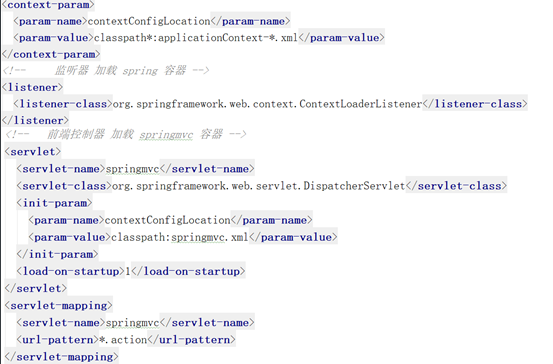
4.分模块构建maven工程
4.1 分模块构建maven工程分析
在现实生活中,汽车厂家进行汽车生产时,由于整个生产过程非常复杂和繁琐,工作量非常大,所以车场都会将整个汽车的部件分开生产,最终再将生产好的部件进行组装,形成一台完整的汽车。
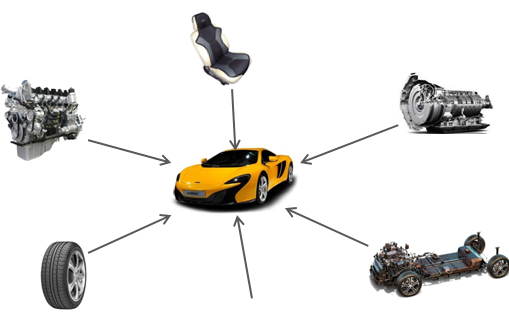

4.2 maven工程的继承
在Java语言中,类之间是可以继承的,通过继承,子类就可以引用父类中非private的属性和方法。同样,在maven工程之间也可以继承,子工程继承父工程后,就可以使用在父工程中引入的依赖。继承的目的是为了消除重复代码。
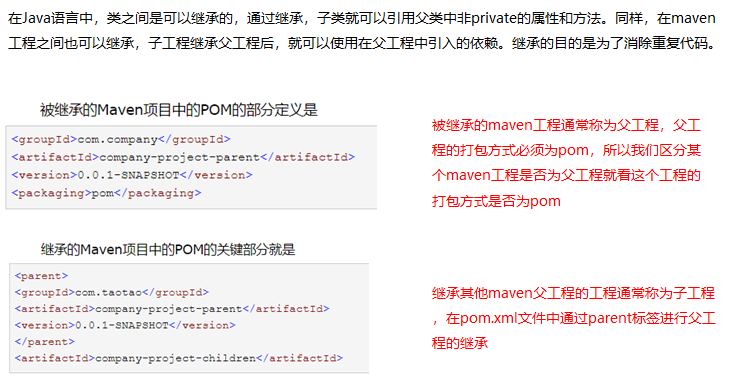
4.3 maven工程的聚合
在maven工程的pom.xml文件中可以使用标签将其他maven工程聚合到一起,聚合的目的是为了进行统一操作。
例如拆分后的maven工程有多个,如果要进行打包,就需要针对每个工程分别执行打包命令,操作起来非常繁琐。这时就可以使用标签将这些工程统一聚合到maven工程中,需要打包的时候,只需要在此工程中执行一次打包命令,其下被聚合的工程就都会被打包了。
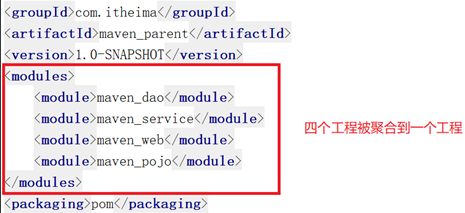
4.4 分模块构建maven工程具体实现
①父工程maven_parent构建
<properties>
<spring.version>5.0.5.RELEASE</spring.version>
<springmvc.version>5.0.5.RELEASE</springmvc.version>
<mybatis.version>3.4.5</mybatis.version>
</properties>
<!--锁定jar版本-->
<dependencyManagement>
<dependencies>
<!-- Mybatis -->
<dependency>
<groupId>org.mybatis</groupId>
<artifactId>mybatis</artifactId>
<version>${mybatis.version}</version>
</dependency>
<!-- springMVC -->
<dependency>
<groupId>org.springframework</groupId>
<artifactId>spring-webmvc</artifactId>
<version>${springmvc.version}</version>
</dependency>
<!-- spring -->
<dependency>
<groupId>org.springframework</groupId>
<artifactId>spring-context</artifactId>
<version>${spring.version}</version>
</dependency>
<dependency>
<groupId>org.springframework</groupId>
<artifactId>spring-core</artifactId>
<version>${spring.version}</version>
</dependency>
<dependency>
<groupId>org.springframework</groupId>
<artifactId>spring-aop</artifactId>
<version>${spring.version}</version>
</dependency>
<dependency>
<groupId>org.springframework</groupId>
<artifactId>spring-web</artifactId>
<version>${spring.version}</version>
</dependency>
<dependency>
<groupId>org.springframework</groupId>
<artifactId>spring-expression</artifactId>
<version>${spring.version}</version>
</dependency>
<dependency>
<groupId>org.springframework</groupId>
<artifactId>spring-beans</artifactId>
<version>${spring.version}</version>
</dependency>
<dependency>
<groupId>org.springframework</groupId>
<artifactId>spring-aspects</artifactId>
<version>${spring.version}</version>
</dependency>
<dependency>
<groupId>org.springframework</groupId>
<artifactId>spring-context-support</artifactId>
<version>${spring.version}</version>
</dependency>
<dependency>
<groupId>org.springframework</groupId>
<artifactId>spring-test</artifactId>
<version>${spring.version}</version>
</dependency>
<dependency>
<groupId>org.springframework</groupId>
<artifactId>spring-jdbc</artifactId>
<version>${spring.version}</version>
</dependency>
<dependency>
<groupId>org.springframework</groupId>
<artifactId>spring-tx</artifactId>
<version>${spring.version}</version>
</dependency>
</dependencies>
</dependencyManagement>
<build>
<plugins>
<plugin>
<groupId>org.apache.maven.plugins</groupId>
<artifactId>maven-compiler-plugin</artifactId>
<version>3.1</version>
<configuration>
<source>1.8</source>
<target>1.8</target>
<encoding>UTF-8</encoding>
</configuration>
</plugin>
</plugins>
</build>
②子工程maven_pojo构建
pom.xml
<dependencies>
<dependency>
<groupId>log4j</groupId>
<artifactId>log4j</artifactId>
<version>1.2.12</version>
</dependency>
<dependency>
<groupId>c3p0</groupId>
<artifactId>c3p0</artifactId>
<version>0.9.1.2</version>
</dependency>
</dependencies>
③3.1子工程maven_dao构建
3.2 配置maven_dao工程的pom.xml文件
<dependencies>
<dependency>
<groupId>com.itheima</groupId>
<artifactId>maven_pojo</artifactId>
<version>1.0-SNAPSHOT</version>
</dependency>
<!-- Mybatis和mybatis与spring的整合 -->
<dependency>
<groupId>org.mybatis</groupId>
<artifactId>mybatis</artifactId>
</dependency>
<dependency>
<groupId>org.mybatis</groupId>
<artifactId>mybatis-spring</artifactId>
<version>1.3.1</version>
</dependency>
<!-- MySql驱动 -->
<dependency>
<groupId>mysql</groupId>
<artifactId>mysql-connector-java</artifactId>
<version>5.1.32</version>
</dependency>
<!-- druid数据库连接池 -->
<dependency>
<groupId>com.alibaba</groupId>
<artifactId>druid</artifactId>
<version>1.0.9</version>
</dependency>
<!-- spring相关 -->
<dependency>
<groupId>org.springframework</groupId>
<artifactId>spring-context</artifactId>
</dependency>
<dependency>
<groupId>org.springframework</groupId>
<artifactId>spring-core</artifactId>
</dependency>
<dependency>
<groupId>org.springframework</groupId>
<artifactId>spring-aop</artifactId>
</dependency>
<dependency>
<groupId>org.springframework</groupId>
<artifactId>spring-expression</artifactId>
</dependency>
<dependency>
<groupId>org.springframework</groupId>
<artifactId>spring-beans</artifactId>
</dependency>
<dependency>
<groupId>org.springframework</groupId>
<artifactId>spring-aspects</artifactId>
</dependency>
<dependency>
<groupId>org.springframework</groupId>
<artifactId>spring-context-support</artifactId>
</dependency>
<dependency>
<groupId>org.springframework</groupId>
<artifactId>spring-test</artifactId>
</dependency>
<dependency>
<groupId>org.springframework</groupId>
<artifactId>spring-jdbc</artifactId>
</dependency>
<dependency>
<groupId>org.springframework</groupId>
<artifactId>spring-tx</artifactId>
</dependency>
<!-- junit测试 -->
<dependency>
<groupId>junit</groupId>
<artifactId>junit</artifactId>
<version>4.12</version>
</dependency>
</dependencies>
3.3 创建DAO接口和Mapper映射文件
package com.itheima.ssm.dao;
import com.itheima.ssm.pojo.Item;
public interface ItemMapper {
public Item findById(int id);
}
<?xml version="1.0" encoding="UTF-8" ?>
<!DOCTYPE mapper PUBLIC "-//mybatis.org//DTD Mapper 3.0//EN"
"http://mybatis.org/dtd/mybatis-3-mapper.dtd">
<mapper namespace="com.itheima.ssm.dao.ItemMapper">
<select id="findById" parameterType="int" resultType="Item">
select * from item where id = #{id}
</select>
</mapper>
3.4 在resources目录下创建spring配置文件applicationContext-dao.xml
<?xml version="1.0" encoding="UTF-8"?>
<beans xmlns="http://www.springframework.org/schema/beans"
xmlns:context="http://www.springframework.org/schema/context"
xmlns:p="http://www.springframework.org/schema/p"
xmlns:aop="http://www.springframework.org/schema/aop"
xmlns:tx="http://www.springframework.org/schema/tx"
xmlns:xsi="http://www.w3.org/2001/XMLSchema-instance"
xsi:schemaLocation="http://www.springframework.org/schema/beans
http://www.springframework.org/schema/beans/spring-beans.xsd
http://www.springframework.org/schema/context
http://www.springframework.org/schema/context/spring-context.xsd
http://www.springframework.org/schema/aop
http://www.springframework.org/schema/aop/spring-aop.xsd
http://www.springframework.org/schema/tx
http://www.springframework.org/schema/tx/spring-tx.xsd">
<!--配置数据源信息,使用druid连接池-->
<bean id="dataSource" class="com.alibaba.druid.pool.DruidDataSource">
<property name="driverClassName" value="com.mysql.jdbc.Driver"/>
<property name="url" value="jdbc:mysql://localhost:3306/ssmtest"/>
<property name="username" value="root"/>
<property name="password" value="root"/>
</bean>
<!--配置spring整合mybatis框架的SQLSessionFactoryBean-->
<bean id="sqlSessionFactory" class="org.mybatis.spring.SqlSessionFactoryBean">
<property name="dataSource" ref="dataSource"/>
<!--扫描pojo包,为实体类创建别名-->
<property name="typeAliasesPackage" value="com.itheima.ssm.pojo"/>
</bean>
<!--mapper扫描器,用于产生代理对象-->
<bean class="org.mybatis.spring.mapper.MapperScannerConfigurer">
<property name="basePackage" value="com.itheima.ssm.dao"/>
</bean>
</bean
④子工程maven_service构建
第一步:创建maven_service工程
第二步:配置maven_service工程的pom.xml文件
<dependencies>
<dependency>
<groupId>com.itheima</groupId>
<artifactId>maven_dao</artifactId>
<version>1.0-SNAPSHOT</version>
</dependency>
</dependencies>
第三步:创建Service接口和实现类
package com.itheima.ssm.service;
import com.itheima.ssm.pojo.Item;
public interface ItemService {
public Item findById(int id);
}
package com.itheima.ssm.service;
import com.itheima.ssm.dao.ItemMapper;
import com.itheima.ssm.pojo.Item;
import org.springframework.beans.factory.annotation.Autowired;
import org.springframework.stereotype.Service;
import org.springframework.transaction.annotation.Transactional;
@Service
@Transactional
public class ItemServiceImpl implements ItemService {
@Autowired
private ItemMapper itemMapper;
public Item findById(int id) {
return itemMapper.findById(id);
}
}
第四步:创建spring配置文件applicationContext-service.xml
<?xml version="1.0" encoding="UTF-8"?>
<beans xmlns="http://www.springframework.org/schema/beans"
xmlns:context="http://www.springframework.org/schema/context"
xmlns:p="http://www.springframework.org/schema/p"
xmlns:aop="http://www.springframework.org/schema/aop"
xmlns:tx="http://www.springframework.org/schema/tx"
xmlns:xsi="http://www.w3.org/2001/XMLSchema-instance"
xsi:schemaLocation="http://www.springframework.org/schema/beans
http://www.springframework.org/schema/beans/spring-beans.xsd
http://www.springframework.org/schema/context
http://www.springframework.org/schema/context/spring-context.xsd
http://www.springframework.org/schema/aop
http://www.springframework.org/schema/aop/spring-aop.xsd
http://www.springframework.org/schema/tx
http://www.springframework.org/schema/tx/spring-tx.xsd">
<!--配置扫描器,扫描Service-->
<context:component-scan base-package="com.itheima.ssm.service"/>
<!--事务管理器-->
<bean id="transactionManager" class="org.springframework.jdbc.datasource.DataSourceTransactionManager">
<property name="dataSource" ref="dataSource"/>
</bean>
<!--事物注解驱动-->
<tx:annotation-driven transaction-manager="transactionManager"/>
</beans>
⑤子工程maven_web构建
第一步:创建maven_web工程,注意打包方式为war
第二步:配置maven_web工程的pom.xml文件
UTF-8
1.8
1.8
<dependencies>
<dependency>
<groupId>com.itheima</groupId>
<artifactId>maven_service</artifactId>
<version>1.0-SNAPSHOT</version>
</dependency>
<dependency>
<groupId>org.springframework</groupId>
<artifactId>spring-webmvc</artifactId>
</dependency>
</dependencies>
<build>
<finalName>maven_web</finalName>
<pluginManagement><!-- lock down plugins versions to avoid using Maven defaults (may be moved to parent pom) -->
<plugins>
<plugin>
<artifactId>maven-clean-plugin</artifactId>
<version>3.1.0</version>
</plugin>
<!-- see http://maven.apache.org/ref/current/maven-core/default-bindings.html#Plugin_bindings_for_war_packaging -->
<plugin>
<artifactId>maven-resources-plugin</artifactId>
<version>3.0.2</version>
</plugin>
<plugin>
<artifactId>maven-compiler-plugin</artifactId>
<version>3.8.0</version>
</plugin>
<plugin>
<artifactId>maven-surefire-plugin</artifactId>
<version>2.22.1</version>
</plugin>
<plugin>
<artifactId>maven-war-plugin</artifactId>
<version>3.2.2</version>
</plugin>
<plugin>
<artifactId>maven-install-plugin</artifactId>
<version>2.5.2</version>
</plugin>
<plugin>
<artifactId>maven-deploy-plugin</artifactId>
<version>2.8.2</version>
</plugin>
</plugins>
</pluginManagement>
</build>
第三步:创建Controller
package com.itheima.ssm.controller;
import com.itheima.ssm.pojo.Item;
import com.itheima.ssm.service.ItemService;
import org.springframework.beans.factory.annotation.Autowired;
import org.springframework.stereotype.Controller;
import org.springframework.ui.Model;
import org.springframework.web.bind.annotation.PathVariable;
import org.springframework.web.bind.annotation.RequestMapping;
@Controller
@RequestMapping("/item")
public class ItemController {
@Autowired
private ItemService itemService;
@RequestMapping("/showItem/{id}")
public String findById(@PathVariable("id") int id, Model model){
Item item = itemService.findById(id);
model.addAttribute("item",item);
return "item";
}
}
第四步:创建jsp页面
第五步:配置web.xml
<!--指定Spring配置文件位置-->
<context-param>
<param-name>contextConfigLocation</param-name>
<param-value>classpath*:applicationContext*.xml</param-value>
</context-param>
<!--配置Spring框架启动时使用的监听器-->
<listener>
<listener-class>org.springframework.web.context.ContextLoaderListener</listener-class>
</listener>
<!--配置SpringMVC的前端控制器-->
<servlet>
<servlet-name>springmvc</servlet-name>
<servlet-class>org.springframework.web.servlet.DispatcherServlet</servlet-class>
<init-param>
<param-name>contextConfigLocation</param-name>
<param-value>classpath:springmvc.xml</param-value>
</init-param>
</servlet>
<servlet-mapping>
<servlet-name>springmvc</servlet-name>
<url-pattern>*.do</url-pattern>
</servlet-mapping>
第六步:创建springmvc配置文件springmvc.xml
<?xml version="1.0" encoding="UTF-8"?>
<beans xmlns="http://www.springframework.org/schema/beans"
xmlns:context="http://www.springframework.org/schema/context"
xmlns:p="http://www.springframework.org/schema/p"
xmlns:aop="http://www.springframework.org/schema/aop"
xmlns:tx="http://www.springframework.org/schema/tx"
xmlns:xsi="http://www.w3.org/2001/XMLSchema-instance"
xsi:schemaLocation="http://www.springframework.org/schema/beans
http://www.springframework.org/schema/beans/spring-beans.xsd
http://www.springframework.org/schema/context
http://www.springframework.org/schema/context/spring-context.xsd
http://www.springframework.org/schema/aop
http://www.springframework.org/schema/aop/spring-aop.xsd
http://www.springframework.org/schema/tx
http://www.springframework.org/schema/tx/spring-tx.xsd">
<!--配置扫描器,扫描Controller-->
<context:component-scan base-package="com.itheima.ssm.controller"/>
<!--视图解析器-->
<bean class="org.springframework.web.servlet.view.InternalResourceViewResolver">
<property name="prefix" value="/WEB-INF/jsp/"/>
<property name="suffix" value=".jsp"/>
</bean>
</beans>
项目整体结构如下:
1)maven_parent为父工程,其余工程为子工程,都继承父工程maven_parent
2)maven_parent工程将其子工程都进行了聚合
3)子工程之间存在依赖关系,比如maven_dao依赖, maven_pojo、maven_service依赖maven_dao、 maven_web依赖maven_service
5. maven私服
5.1 私服说明
maven仓库分为本地仓库和远程仓库,而远程仓库又分为maven中央仓库、其他远程仓库和私服(私有服务器)。其中,中央仓库是由maven官方提供的,而私服就需要我们自己搭建了。
maven私服就是公司局域网内的maven远程仓库,每个员工的电脑上安装maven软件并且连接maven私服,程序员可以将自己开发的项目打成jar并发布到私服,其它项目组成员就可以从私服下载所依赖的jar。私服还充当一个代理服务器的角色,当私服上没有jar包时会从maven中央仓库自动下载。
nexus 是一个maven仓库管理器(其实就是一个软件),nexus可以充当maven私服,同时nexus还提供强大的仓库管理、构件搜索等功能。
5.2 搭建maven私服
①下载nexus
https://help.sonatype.com/repomanager2/download/download-archives---repository-manager-oss
②安装nexus
将下载的压缩包进行解压,进入bin目录

打开cmd窗口并进入上面bin目录下,执行nexus.bat install命令安装服务(注意需要以管理员身份运行cmd命令)

③启动nexus
经过前面命令已经完成nexus的安装,可以通过如下两种方式启动nexus服务:
在Windows系统服务中启动nexus
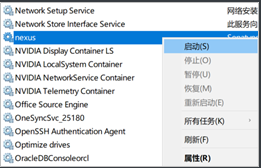
在命令行执行nexus.bat start命令启动nexus

④访问nexus
启动nexus服务后,访问http://localhost:8081/nexus
点击右上角LogIn按钮,进行登录。使用默认用户名admin和密码admin123登录系统
登录成功后点击左侧菜单Repositories可以看到nexus内置的仓库列表(如下图)
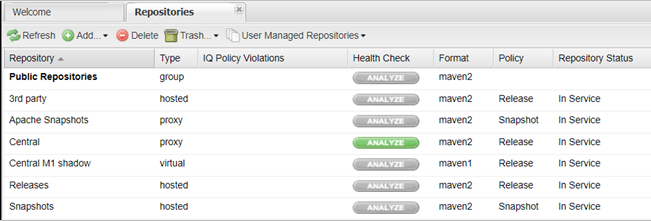
nexus仓库类型
通过前面的仓库列表可以看到,nexus默认内置了很多仓库,这些仓库可以划分为4种类型,每种类型的仓库用于存放特定的jar包,具体说明如下:
①hosted,宿主仓库,部署自己的jar到这个类型的仓库,包括Releases和Snapshots两部分,Releases为公司内部发布版本仓库、 Snapshots为公司内部测试版本仓库
②proxy,代理仓库,用于代理远程的公共仓库,如maven中央仓库,用户连接私服,私服自动去中央仓库下载jar包或者插件
③group,仓库组,用来合并多个hosted/proxy仓库,通常我们配置自己的maven连接仓库组
④virtual(虚拟):兼容Maven1版本的jar或者插件
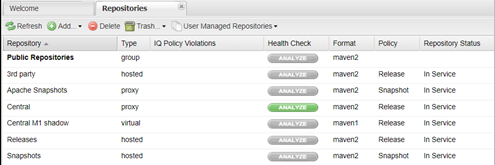
nexus仓库类型与安装目录对应关系
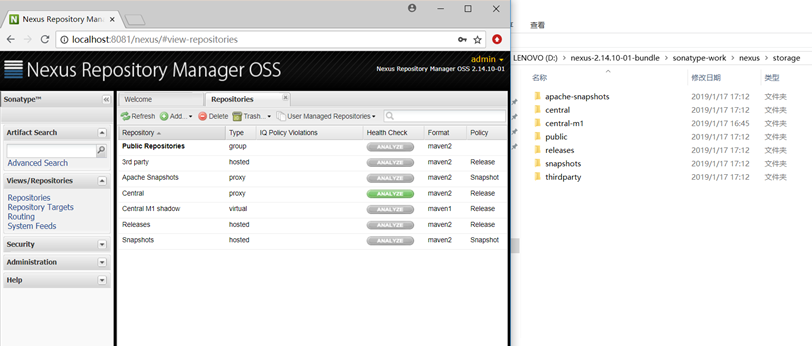
5.3 将项目发布到maven私服
maven私服是搭建在公司局域网内的maven仓库,公司内的所有开发团队都可以使用。例如技术研发团队开发了一个基础组件,就可以将这个基础组件打成jar包发布到私服,其他团队成员就可以从私服下载这个jar包到本地仓库并在项目中使用。
将项目发布到maven私服操作步骤如下:
- 配置maven的settings.xml文件
<server>
<id>releases</id>
<username>admin</username>
<password>admin123</password>
</server>
<server>
<id>snapshots</id>
<username>admin</username>
<password>admin123</password>
</server>
注意:一定要在idea工具中引入的maven的settings.xml文件中配置
- 配置项目的pom.xml文件
<distributionManagement>
<repository>
<id>releases</id>
<url>http://localhost:8081/nexus/content/repositories/releases/</url>
</repository>
<snapshotRepository>
<id>snapshots</id> <url>http://localhost:8081/nexus/content/repositories/snapshots/</url> </snapshotRepository>
</distributionManagement>
- 执行mvn deploy命令
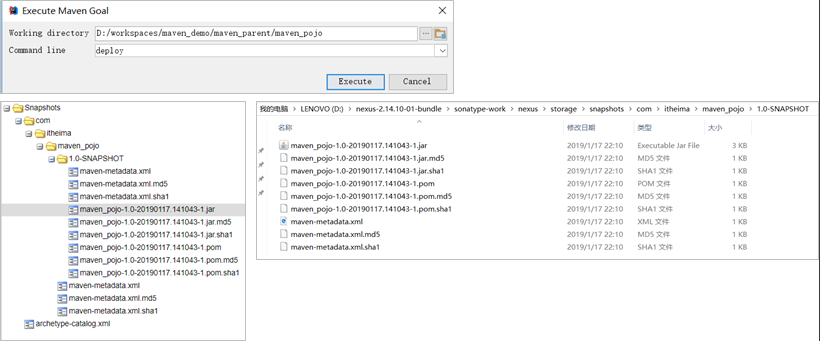
5.4 从私服下载jar到本地仓库
前面我们已经完成了将本地项目打成jar包发布到maven私服,下面我们就需要从maven私服下载jar包到本地仓库。
具体操作步骤如下:
在maven的settings.xml文件中配置下载模板
<profile>
<id>dev</id>
<repositories>
<repository>
<id>nexus</id>
<!--仓库地址,即nexus仓库组的地址-->
<url>
http://localhost:8081/nexus/content/groups/public/</url>
<!--是否下载releases构件-->
<releases>
<enabled>true</enabled>
</releases>
<!--是否下载snapshots构件-->
<snapshots>
<enabled>true</enabled>
</snapshots>
</repository>
</repositories>
<pluginRepositories>
<!-- 插件仓库,maven的运行依赖插件,也需要从私服下载插件 -->
<pluginRepository>
<id>public</id>
<name>Public Repositories</name>
<url>
http://localhost:8081/nexus/content/groups/public/</url>
</pluginRepository>
</pluginRepositories>
</profile>
在maven的settings.xml文件中配置激活下载模板
<activeProfiles>
<activeProfile>dev</activeProfile>
</activeProfiles>
6. 将第三方jar安装到本地仓库和maven私服
在maven工程的pom.xml文件中配置某个jar包的坐标后,如果本地的maven仓库不存在这个jar包,maven工具会自动到配置的maven私服下载,如果私服中也不存在,maven私服就会从maven中央仓库进行下载。
但是并不是所有的jar包都可以从中央仓库下载到,比如常用的Oracle数据库驱动的jar包在中央仓库就不存在。此时需要到Oracle的官网下载驱动jar包,然后将此jar包通过maven命令安装到我们本地的maven仓库或者maven私服中,这样在maven项目中就可以使用maven坐标引用到此jar包了。
6.1 将第三方jar安装到本地仓库
①下载Oracle的jar包(略)
②mvn install命令进行安装
mvn install:install-file -Dfile=ojdbc14-10.2.0.4.0.jar -DgroupId=com.oracle -DartifactId=ojdbc14 –
Dversion=10.2.0.4.0 -Dpackaging=jar
③查看本地maven仓库,确认安装是否成功

6.2 将第三方jar安装到maven私服
①下载Oracle的jar包(略)
②在maven的settings.xml配置文件中配置第三方仓库的server信息
<server>
<id>thirdparty</id>
<username>admin</username>
<password>admin123</password>
</server>
③执行mvn deploy命令进行安装
mvn deploy:deploy-file -Dfile=ojdbc14-10.2.0.4.0.jar -DgroupId=com.oracle -DartifactId=ojdbc14 –
Dversion=10.2.0.4.0 -Dpackaging=jar –
Durl=http://localhost:8081/nexus/content/repositories/thirdparty/ -DrepositoryId=thirdparty
maven高级笔记的更多相关文章
- Maven学习笔记—仓库
Maven仓库 1 什么是Maven仓库 在Maven中,任何一个依赖.插件或者项目构建的输出,都可以成为构件,而Maven通常在某个位置统一的存储所有Maven项目共享的构件,这个统一的位置就是Ma ...
- Maven学习笔记-03-Eclipse下maven项目在Tomcat7和Jetty6中部署调试
现在最新的Eclipse Luna Release 已经内置了Maven插件,这让我们的工作简洁了不少,只要把项目直接导入就可以,不用考虑插件什么的问题,但是导入之后的项目既可以部署在Tomcat也可 ...
- Maven学习笔记-04-Eclipse下maven项目在Tomcat7和Jetty6中部署调试
现在最新的Eclipse Luna Release 已经内置了Maven插件,这让我们的工作简洁了不少,只要把项目直接导入就可以,不用考虑插件什么的问题,但是导入之后的项目既可以部署在Tomcat也可 ...
- MAVEN学习笔记之Maven插件的应用(4)
MAVEN学习笔记之Maven插件的应用(4) <build> <pluginManagement> <plugins> <plugin> <gr ...
- MAVEN学习笔记之Maven生命周期和插件简介(3)
MAVEN学习笔记之Maven生命周期和插件简介(3) clean compile site三套生命周期相互独立. clean pre-clean 执行清理前的工作 clean 清理上一次构建生成的所 ...
- MAVEN学习笔记之私服Nexus(2)
MAVEN学习笔记之私服Nexus(2) 私有服务器搭建 Nexus www.snatype.org下载 snatype-work 是默认nexus存储nexus a:将bin添加到环境中 Admin ...
- MAVEN学习笔记之基础(1)
MAVEN学习笔记之基础(1) 0.0 maven文件结构 pom.xml src main java package resource test java package resource targ ...
- Maven 学习笔记(二)
前面一文——Maven 学习笔记(一)中已经提到了 pom 的大部分配置,Maven 本质上是一个插件框架,它的核心并不执行任何具体的构建任务,所有这些任务都交给创建来完成,每一个任务都会对应一个插件 ...
- javascript高级笔记——内含事件,DOM,BOM等
JavaScript高级笔记 1,DOM的简单学习 1.1,功能:用于控制HTML文档的内容: 1.2,获取页面标签对象:Element *document.getElementById(" ...
随机推荐
- 【python接口自动化】- DDT数据驱动测试
简单介绍 DDT(Date Driver Test),所谓数据驱动测试,简单来说就是由数据的改变从而驱动自动化测试的执行,最终引起测试结果的改变.通过使用数据驱动测试的方法,可以在需要验证多组数据 ...
- promise引用自吕大豹
去年6月份, ES2015正式发布(也就是ES6,ES6是它的乳名),其中Promise被列为正式规范.作为ES6中最重要的特性之一,我们有必要掌握并理解透彻.本文将由浅到深,讲解Promise的基本 ...
- 使用SharePoint App-Only获得访问权限
目前在开发SharePoint Online的过程中,主要使用通过Azure AD的方式获得应用的访问权限,但是SharePoint App-Only的方式依旧被保留了.使用这种方式进行CSOM开发比 ...
- 【Flutter】功能型组件之数据共享
前言 InheritedWidget提供了一种数据在widget树中从上到下传递.共享的方式,例如在应用的根widget中通过InheritedWidget共享了一个数据,那么便可以在子widge ...
- Linux tar压缩和解压
经常会忘记 tar 压缩和解压命令的使用,故记下来. 1. 打包压缩 tar -zcvf pack.tar.gz pack/ #打包压缩为一个.gz格式的压缩包 tar -jcvf pack.tar. ...
- JS navigator.userAgent
var u = navigator.userAgent; var isAndroid = u.indexOf('Android') > -1 || u.indexOf('Adr') > - ...
- 更改mysql的密码
mysql> set password for 'root'@'localhost' =PASSWORD('');Query OK, 0 rows affected (0.17 sec) mys ...
- ctfhub技能树—web前置技能—http协议—Cookie
打开靶机环境 查看显示内容 根据提示,需要admin登录才能得到flag 题目介绍为Cookie欺骗.认证.伪造 介绍一下cookie和session 一.cookie: 在网站中,http请求是无状 ...
- 用其他主机docker login登录Harbor仓库报错
做微服务的时候,我准备把编译好的jar包,部署到我的Harbor仓库上,却登录不上去,出现以下报错: [root@k8s-master ~]# docker login 192.168.30.24Us ...
- oracle可传输表空间测试
使用RMAN在恢复表空间的时候,表空间数据文件DBID和恢复数据库的数据文件DBID必须相同 可传输表空间不需要这样,也就是可以快速的把这个表空间插入另一个数据库使用 可传输表空间内的对象必须不依赖与 ...
